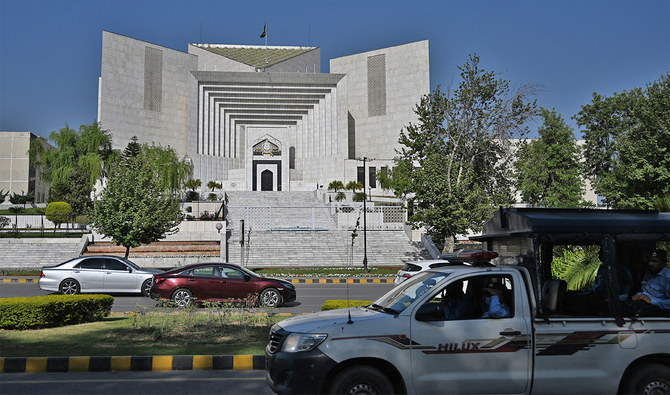ISLAMABAD: The Supreme Court on Monday rejected the federal government's request to form a full court bench to hear all petitions regarding last week’s election of the Punjab chief minister, in which the deputy speaker had nullified 10 votes polled in favour of the opposition's candidate.
The judgment came after hours-long hearing of the petition relating to the contentious re-election of Hamza Shehbaz on July 22, when Punjab Assembly Deputy Speaker Dost Muhammad Mazari invalidated 10 votes cast against him by the opposition Pakistan Muslim League-Quaid (PML-Q) members.
Mazari based his ruling on a recent Supreme Court verdict that endorsed the idea of disqualifying legislators for voting against party lines. The deputy speaker quoted a letter written to him by PML-Q chief Chaudhry Shujaat Hussain, asking his party lawmakers to support Shehbaz instead of his rival and Hussain’s cousin, Chaudhry Pervaiz Elahi.
The opposition candidate moved the court against the deputy speaker’s ruling on Friday night, claiming it was the prerogative of the parliamentary party head, not the party chief, to direct legislators ahead of voting in the provincial assembly.
The federal government, comprising a number of coalition parties, demanded a full court bench of the Supreme Court decide on the validity of the CM election.
During Monday's hearing, a three-member bench, led by Chief Justice Umar Ata Bandial, heard arguments of all sides, including the Punjab government.
“This is not a complex matter. The full court is constituted in difficult and complex issues,” the chief justice remarked, while hearing the case.
“There is only one question in the case whether a party chief can issue directions [to parliamentary party] or not.”
In Friday’s election, the opposition alliance, comprising former Prime Minister Imran Khan’s Pakistan Tehreek-e-Insaf (PTI) and the PML-Q parties, bagged 186 votes and the Pakistan Muslim League-Nawaz-led ruling coalition secured 179 votes in the provincial house of 371.
The election was held on the directions of the Supreme Court after 25 members of Khan's PTI party were disqualified for voting for the rival PML-N candidate, Shehbaz, in an April election for the same post.
In a unanimous decision in May, the Election Commission of Pakistan (ECP) had said the PTI dissidents were being de-seated for defecting from the party under Article 63-A. The Supreme Court of Pakistan, in its interpretation of Article 63-A, has said votes cast against the party direction “cannot be counted and must be disregarded.”
According to Article 63-A of the constitution, a parliamentarian can be disqualified on grounds of defection if he or she “votes or abstains from voting in the House contrary to any direction issued by the parliamentary party to which he belongs, in relation to election of the prime minister or chief minister; or a vote of confidence or a vote of no-confidence; or a money bill or a Constitution (amendment) bill.”
During the hearing on Monday, the chief justice also noted that the candidate who bagged the majority of votes in the election was out and the one who got 179 votes was declared the chief minister of the province.
“A solid foundation is required to retain Hamza Shehbaz as the chief minister,” Chief Justice Bandial said.
The chief justice earlier said the constitution of a full bench was not possible before September as only two judges besides the three-member bench were available in Islamabad. “Should we stop all work till then,” he said.
A detailed verdict on the formation of the full bench will be issued later, while the court will resume hearing arguments on the deputy speaker's ruling at 11:30am on Tuesday.


















